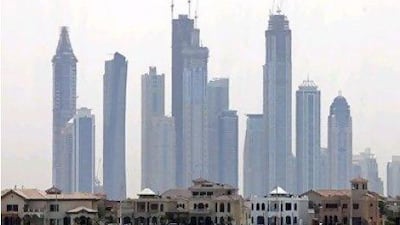Dubai expects the number of new firms setting up in the emirate will be cut by half this year, partly because of fading appetite for new property ventures.
A total of 5,684 licences were granted to new businesses launching outside free zones between January and the end of last month, said Mohammed al Saadi, the chief executive of the Dubai Department of Economic Development's (DED) business registration and licensing sector. He did not provide a comparative figure for the same period last year.
DED anticipates annual growth in new businesses to fall from 18 per cent last year to about 9 per cent this year, he said. "Real estate and real estate-related services have declined a bit, but at the same time there is a positive sense towards the retail sector, food and beverages and luxurious products [firms]," Mr al Saadi said yesterday.
With less money to make in the emirate's deflated property market, the number of firms interested in setting up there has cooled.
A total of 217 property projects in Dubai were cancelled as of the end of last month after a review of the industry during the past two years, a government bond prospectus revealed.
The decline in new property business has been offset to some degree by faster growth in sectors such as retail, as consumer spending has picked up.
To cater for new business growth, DED is moving more of its services online. It has launched an online process for initial approval of new business applications and for renewing existing licences.
This enables business owners to complete their registrations faster than having to visit a branch in person.
Long-term, switching more of DED's services online will generate financial savings, said Mr al Saadi.
"If we are very pessimistic we say we won't have that same growth this year [as last year]. We might have half of that, which is 9 per cent. If that growth continues, in five years' time we need to double our registration capacity and open different branches. If that continues, in 10 years' time we would need an army of registration staff."
Instead, more online services will free up staff so they can be given training in other fields, said Mr al Saadi.
At the same time, DED has accredited other organisations to provide business registrations and licensing services outside of DED working hours. These include Tas'heel Center, Emirates Secretarial Services and the law firm Al Tamimi & Company.
About 190,000 firms are registered to operate in Dubai outside the free zones scattered across the emirate. Many international firms tend to favour setting up in free zones, where they can own 100 per cent of their business without needing local partners.

